http://von.gov.ng/nigeria-will-emerge-worlds-best-emissions-reduction-president-buhari/
Environment, Climate Change, Agriculture ,Biodiversity,Energy,sustainable development

Morocco hosts Africa coordinating office on Desertification and Drought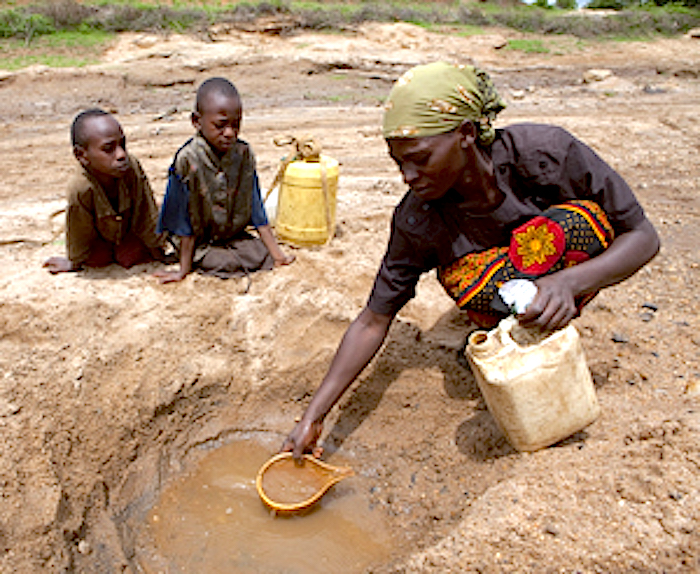
The Kingdom of Morocco will host the Africa Regional coordination Unit of the United Nations Convention to Combat Desertification (UNCCD).
This will provide the secretariat with vital support services that the Parties to the Convention need to effectively implement the Convention in Africa.
This was announced by Mr. Abdeladim Lhafi, Morocco’s High Commissioner for Water and Forests and the Fight against Desertification and Commissioner of the 22nd session of Conference of the Parties to the Climate Change Conference (COP22), currently under way in Marrakesh.
“Africa is experiencing some of the severest droughts in the world that are increasing in frequency and spreading to new areas, and requires a strong Regional Coordination Unit. I am sure that with the help of the Moroccan Authorities, and by drawing on their knowledge and expertise in this subject, we will have a very effective Regional Coordination Unit,” said Ms. Monique Barbut, Executive Secretary of the UNCCD, when accepting the offer.
Mr. Lhafi said that “in response to the Executive Secretary’s invitation of May 2014 to African governments to submit proposals to host the regional coordination unit in conformity with the appropriate conditions and comparable to other regional coordination units, Morocco presented its offer during the 12th session of the [UNCCD] Conference of the Parties in October 2015 in Ankara. Morocco’s offer was also favorably received following informal consultations during the 15th session of the Committee for the Review of Implementation of the Convention (CRIC 15), which was held from 17-20 October 2016 in Nairobi.”
The Convention
The Convention has five regional implementation annexes that provide a coordinated regional approach both in tackling desertification and drought effectively and in mobilizing all the relevant stakeholders to take actions to implement the Convention.
The Convention’s other regional coordination units are based in Thailand, for the Asia region, Chile, for the Latin America and Caribbean region, Turkey, for the Northern Mediterranean region, and in Germany, for the Central and Eastern European countries.
About the UNCCD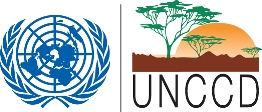
The United Nations Convention to Combat Desertification (UNCCD) is the sole legally binding international agreement on land issues. The Convention works, with partners, to promote good land stewardship. Its 195 Parties aim to combat desertification, mitigate drought and achieve land degradation neutrality (LDN). By achieving LDN, we will secure the health and productivity of the land, mitigate the effects of drought and make people and ecosystems more resilient to climate change.
UNCCD


Experts transform agriculture and nutrition amid climate change
Agricultural experts and leaders from all over the world have developed an ambitious plan to transform global agriculture, as a response to the challenge of climate change and real threats to the production of the planet’s major crops in a hotter world.
This is an outcome of a recent round table interaction held in Nairobi seeking to create a roadmap that will implement the Global Action Plan for Agricultural Diversification (GAPAD)
Leaders and experts who deliberated on the initiative included representatives from the African Union Commission (AUC), the Sustainable Development Goals Centre for Africa and the Australian High Commission, representatives from research and development organisations and a host of journalists drawn from different media organisations.
GEPAD is a declaration agreed upon by world leaders during the United Nations Framework Convention on Climate Change (UNFCCC COP 21) in Paris in December 2015.
GAPAD
The initiative had earlier been designed to support the Sustainable Development Agenda 2030, and to responds to the Declaration on Agriculture Diversification before it was adopted by the United Nations in September 2015.
“Currently, over 7 billion people depend on just four major crops to supply three-quarters of their food,” said Dr Dennis Rangi, the Director General, Development, at the CAB International. Studies project that the population will reach 9 billion by 2050.
According to Rangi “It is therefore becoming increasingly accepted that in a hotter world, options for agricultural diversification are needed that include a wider range of crops and cropping systems,”
He said that there was need for increased species diversity and more resilient agricultural ecosystems that include new crops for food and non-food uses.
The GAPAD initiative is addressing six of the 17 Sustainable Development Goals (SDGs): 2 ‘zero hunger’, 7 ‘affordable and clean energy’, 12 ‘responsible consumption and production’, 13 ‘climate action’, 15 ‘life on land’ and 17’ partnerships for the goals’. Agricultural diversification will also eventually contribute to achieving SDG 1on ‘no poverty’.
Agricultural Diversification
According to Ruth Oniang’o, a Kenyan Professor in Food Science and Nutrition, agricultural diversification can improve nutrition, enhance food security and help alleviate poverty amongst other benefits.
The experts have therefore developed GAPAD targets based on each of the eight SDG2 targets but focused on the role of agricultural diversification, and have identified the priority activities needed to achieve these targets.
The next step will involve a small group of eminent, respected and highly qualified individuals who will distill and refine the output of the Nairobi round table, and integrate these with the distilled and refined outputs from the round tables that addressed the other five SDGs being addressed by GAPAD.
The result is expected to be a compelling, credible, inclusive, authoritative and investable global plan for agricultural diversification in a hotter world, which has the support of all the relevant institutions.
It is anticipated that GAPAD will be formally launched in mid-2017. At the same time the bold plan for agricultural diversification will be submitted to the secretariat of UNSDA 2030.
In the meantime, GAPAD will seek to build a network of experts, stakeholders, institutions, governments, regional and international organisations, and distinguished individuals to support and champion this urgent and important initiative.
PAMACC NEWS AGENCY

|
|


An Energy conference has called on the Nigerian government to prioritize national and community energy needs over global economic models that promote inequalities.
The one-day conference organised by the Environmental Rights Action/Friends of the earth ERA/FoEN Nigeria and funded by Friends of the Earth Norway, called for a reform of the renewable energy policy and proposal for a renewable energy policy bill.
The conference, the sixth in the series, told government to promote decentralized alternative energy with a focus on renewables which must be affordable and environment- friendly.
The conference demanded that “Clean and safe community alternative energy models be vigorously pursued to deliver on community energy needs that are off-grid and mini-grids.”
It said that the Nigerian government should match words with action by allocating a reasonable per cent of its annual income to funding for research and development of alternative energy sources such as solar, wind and biomass, among others.
Other demands
The renewable energy conference demanded for the establishment of appropriate institutional infrastructure and frameworks to support expanding energy supply and access and their sustainability.
It stressed the need for the harmonisation and integration of sustainable energy policies in development at all levels and development of a renewable energy model that is back by an Act of Parliament as well as zero tariffs on renewable energy products to allow greater energy access.
“Government should divest funding, loans and subsidies from fossil fuel development and oil prospecting and instead invest in renewable sources of energy.” it said.
The Conference
The conference brought together civil society, development groups, government officials and community-based groups who shared experiences and analyzed critically issues concerning energy policy in Nigeria, the environmental and social impacts of extractive processes.
It brought to the fore, serious issues on the growing energy deficit in Nigeria and renewed aggressive extraction of natural resources including oil and gas from Nigeria and other parts of Africa to meet increasing demand in North America, Europe and other countries like Russia, Brazil, India and China.processes
It also proffered solutions and energy models to address energy deficit and addressed peoples’ right to a new energy model in Nigeria.
PR/Cokey


A National Civil Society Consultative Forum on TOWARDS MARRAKECH COP22. is underway in Nigeria’s capital, Abuja.
The forum, which brings together state and non-state actors from the six geo-political zones of the country including the media will focus on:
The Forum is being organised by Climate and Sustainable Development Network (CSDevNet) in collaboration with the Department of Climate Change, Federal Ministry of Environment, Embassy of the Kingdom of Morocco, Abuja ,Pan African Climate Justice Alliance (PACJA), Heinrich Boll Stiftung,Pan-African Media Alliance For Climate Change (PAMACC)
Climate and Sustainable Development Network (CSDevNet) is a network of about300 civil society organisations cutting across the six geo-political zones in Nigeria. We bring together organizations, comprising grassroots community practitioners, trusts, federations of slum dwellers and pastoralists, home based caregivers, youth, media, women and faith-based organizations, including those working on child welfare, the elderly, disabled and those focusing on livestock and animal welfare, to commonly promote and advocate pro-poor, climate-friendly and equity-based responses to climate change and sustainable development.
Background
The Paris Agreement, adopted last year in December at 21st session of Conference of the Parties (COP 21) by 196 parties (195 countries and the European Union) to the UN Framework Convention on Climate Change (UNFCCC) constitutes a landslide agreement in global efforts to mitigate climate change, as well as prepare societies through adaptive action to the likely negative consequences we are yet to encounter even if mitigation efforts succeed in limiting global warming to the below-2°C target.

 The Environmental Rights Action/Friends of the Earth Nigeria (ERA/FoEN) has described suggestions by the Speaker of Lagos House of Assembly, Hon. Mudashiru Obasa that privatization is the answer to the water needs of Lagosians as “betrayal of the trust reposed on him by the electorate”.
The Environmental Rights Action/Friends of the Earth Nigeria (ERA/FoEN) has described suggestions by the Speaker of Lagos House of Assembly, Hon. Mudashiru Obasa that privatization is the answer to the water needs of Lagosians as “betrayal of the trust reposed on him by the electorate”.Reacting, ERA/FoEN’s Deputy Director, Akinbode Oluwafemi said: “The proposal of the Speaker on an issue of such magnitude which bothers on the rights of Lagos citizens to a free gift of nature is not satisfactory and also reveals the depth of financial deprivation the water sector has been subjected to owing to the perception that water must be commodified for it to be more widely and readily available”
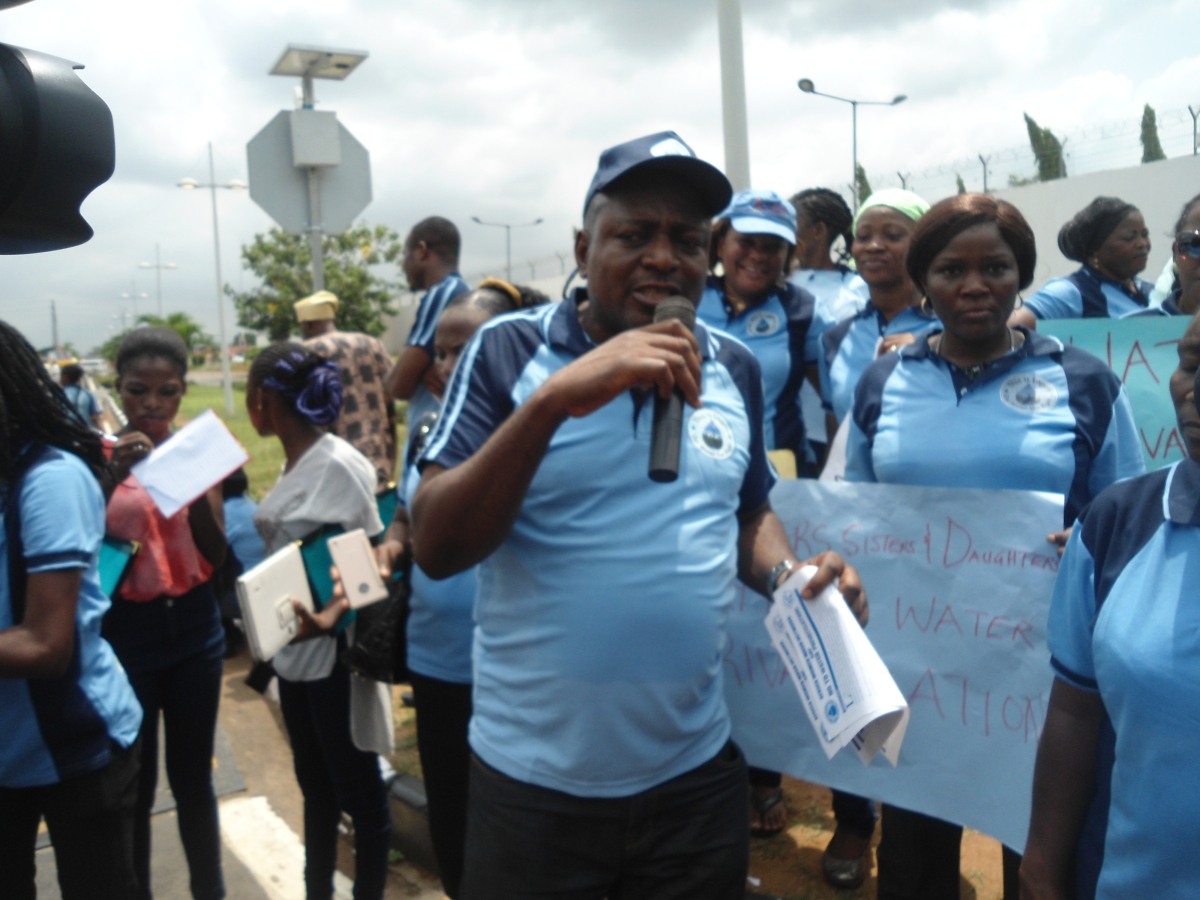
Twenty-three members of the U.S. Congressional Black Caucus (CBC) have expressed solidarity with people in the global community standing in support of the human right to water, with particular mention of the dangers of privatisation of water in Lagos.
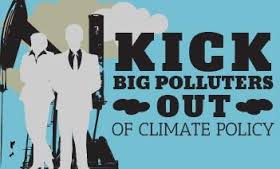
Corporate Accountability International and more than 224,000 organisations and people have called on the parties of the United Nations Framework Convention on Climate Change (UNFCCC), in the final days of the Bonn Climate Change Conference,to protect the treaty and climate policy making from the undue influence of the globe’s biggest polluters.
The call comes as record droughts and rainfall as well as relentless heat waves claim lives around the globe and some of the world’s biggest polluters attempt to co-opt the treaty process and influence negotiating outcomes and a few months before the Paris meeting.
The call signals a global rejection of corporate capture of climate change policy making.
The meeting in Bonn is one of the last formal meetings of the Parties before the next full Conference of the Parties to the treaty in Paris—largely regarded as a make-or-break moment for the agreement.
Industry interference
“Why would you let the professional arsonist join the volunteer fire department?” said Bill McKibben, author and co-founder of 350.org, “These are the guys who want to keep the problem going, not solve it.”
From aggressive lobbying of national governments to bankrolling of international meetings, the fossil fuel industry interferes at all levels.
Industry co-optation of treaty meetings has been a growing problem and a primary obstacle to progress. At the 19th Conference of the Parties (COP) in Warsaw, corporations with a direct conflict of interest in the treaty’s success not only sponsored the talks, they were given preferential access to delegates.
In May, it was revealed that COP 21 in Paris may be yet another “Corporate COP” with the announcement of EDF and Suez Environment as lead sponsors.
Suez Environment, infamous for its dealings in water privatization, is partially owned by ENGIE, formerly GDF Suez, which profits from fracking operations around the world, putting it at direct odds with the advancement of the treaty. ENGIE and EDF’s coal operations contribute to nearly 50% of France’s emissions.
The Petitioners say the cozy relationship between polluters and the UNFCCC has become increasingly institutionalized. The Lima-Paris Action Agenda (LPAA), a joint project of the incoming and outgoing COP presidents, the Office of the Secretary-General of the United Nations and the UNFCCC Secretariat, encourages direct engagement with non-state actors—primarily identified as sub-national governments and corporations—as stakeholders in the policy making process.
“The fossil fuel industry is not a partner in the solution—it is the driver of the crisis. Giving big polluters a seat at the table glosses over the glaring conflict of interest fossil fuel corporations have in a real solution to climate change,” said John Stewart, deputy campaign director at Corporate Accountability International.
According to John, “Inviting gas, oil and coal corporations to shape climate policy is akin to looking to Big Tobacco to shape public health policy.”
The Petition
“We call on you to take immediate action to protect COP 21 and all future negotiations from the influence of big polluters. Given the fossil fuel industry’s years of interference intended to block progress, push false solutions, and continue the disastrous status quo, the time has come to stop treating big polluters as legitimate “stakeholders” and to remove them from climate policy making.”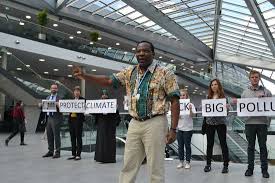
“Today, we are facing the prospect of the destruction of life as we know it and irreversible damage to our planet due to climate change. Scientists are telling us with ever more urgency that we must act quickly to stop extracting fossil fuels and reduce greenhouse gas emissions. But the world’s largest polluters have prevented progress on bold climate action for far too long.” The petition said.
The petitioners called on the Parties to the UNFCCC to protect the UN climate talks and climate policy making around the world from the influence of big polluters.
According to them, “The world is looking to the next round of negotiations – in Paris this December – for decisive action on climate. This is a pivotal moment to create real solutions. We need a strong outcome from the Paris talks in order to seize the momentum of a growing global movement, and to urge leaders to take bolder action to address the climate crisis.”
They claimed that the fossil fuel industry and other transnational corporations that have a vested interest in stopping progress continue to delay, weaken, and block climate policy at every level.
“From the World Coal Association hosting a summit on “clean coal” around COP 19 to Shell aggressively lobbying in the European Union for weak renewable energy goals while promoting gas – these big polluters are peddling false solutions to protect their profits while driving the climate crisis closer to the brink.” They insisted.
A decade ago, the international community took on another behemoth industry – Big Tobacco – and created a precedent-setting treaty mechanism that removed the tobacco industry from public health policy. This can happen again here.
Corporate Accountability International will deliver this message and the list of signatures at the climate talks in Bonn, Germany, the first week of June. They will do another delivery by the end of COP 21 in Paris this December.
To view the petition, go to www.KickBigPollutersOut.com